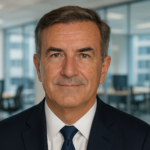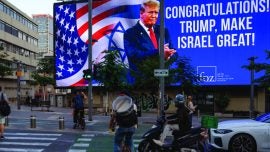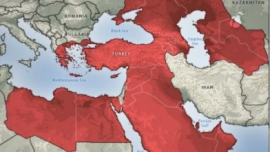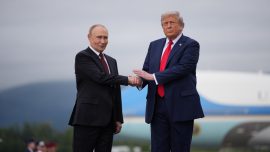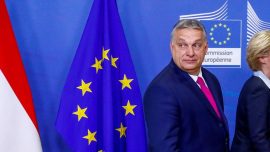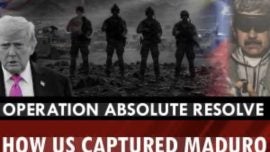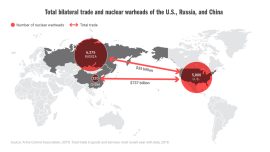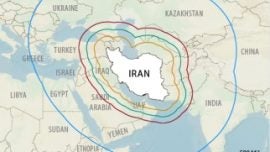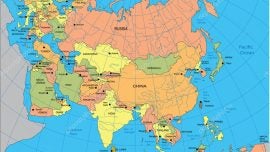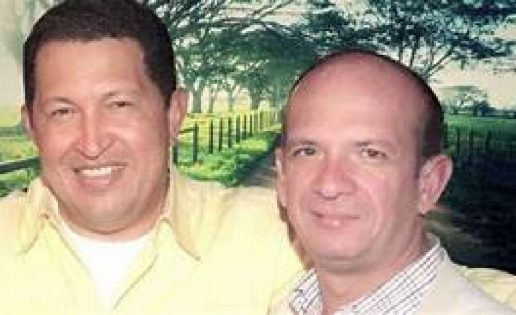
Dramatis personae I: General Hugo Carvajal, a.k.a. ‘El Pollo’ Carvajal
Many of the secrets of the criminal and political enterprise that brings together Colombian-sourced drug trafficking, international terrorist networks, and politics are kept in the hands and in the head of Venezuelan General Hugo Carvajal, who directed Hugo Chávez’s and Nicolás Maduro’s regime’s Intelligence services for years, before leaving the country.
At present, Hugo Carvajal is detained in Spain waiting to be extradited to the United States (US), from where he has been wanted for years, for crimes of drug trafficking and cooperation with international terrorism.
General Hugo Armando Carvajal Barrios (Puerto La Cruz, Venezuela, 1960) is also known as ‘El Pollo‘ Carvajal since his cadet years.
He was a disciple of Hugo Chávez at the Military Academy of Fort Tiuna, where he graduated as number 59 of his promotion, and became one of his most trusted men.
When Commander Chávez launched the failed 1992 coup against President Carlos Andrés Pérez, Carvajal supported him and, consequently, ended up in jail, as well as Commander Chávez.
Carvajal’s loyalty to Chávez was more than proven and, since then until Chávez’s death, he served Commander Chávez in sensitive positions of great responsibility.
Indeed, Chávez, once in power, appointed Carvajal the top leader of Venezuelan’s Military Intelligence, a position in which he served for eight years – between July 2004 and December 2011, during Hugo Chávez’s term, and again from March 2013 to January 2014, after Chávez’s death, under Nicolás Maduro presidency, who ended up removing him from that position in the friendliest way possible.
From that function, Carvajal had access to and controlled the who’s who in the corruption and criminality plot woven by the Chavista regime.
Both Carvajal’s friends and enemies alike recognize that the information he possesses is invaluable.
Martín Rodil, president of the Venezuelan American Leadership Council and an expert on security issues, argues that Carvajal prepared Intelligence files on all the criminal activities in which the Venezuelan Bolivarian regime was involved, since the time of Chávez, whether it was drug trafficking, arms trafficking, human trafficking, corruption, or money laundering.
In Rodil’s opinion, Carvajal has the details of all the actors and all the crimes committed during Chávez’s and Maduro’s years in power in Venezuela.
Carvajal’s task was not limited to collecting and providing Chávez with sensitive information.
After Pedro Carmona’s failed coup against Chávez on April 11, 2002, Hugo Chávez reacted decisively to guarantee his stay in power without time limits.
To do this, Chávez was very much aware that the only real source of threat to him within Venezuela was the very institution from which he originally came from and that he had used for his rise to power, that is, the Armed Forces.
Carvajal was also the coordinator and executor of La Habana’s most sensitive instructions to Venezuelan governments.
Following his Cuban masters’ example, Chávez broke with merit-based promotion processes and procedures inside the Military, which were replaced with political loyalty.
Chávez wanted to transform the Military Institution into a subordinate part of his revolutionary project and subjected generals and officers to his commands that were made to represent the will of the revolution.
Carvajal was the man who executed that project for Chávez and who, thanks to the information he had amassed about each one of the Armed Forces’ leaders and soon-to-be in leading roles within the Military Institution, carefully selected and recommended to Chávez those who were loyal and, therefore, worthy of promotion beyond any doubt.
Therefore, ‘El Pollo‘ Carvajal was the necessary and most trusted operator for Chávez to turn the Venezuelan Military Institution into loyal Armed Forces to the Chavista government and not at the service of the State.
To this end, co-opting the heads of the Armed Forces by making them participants and beneficiaries of corruption and drug trafficking activities managed from the apex of Venezuelan power assured Carvajal of his influence and power and protected him against any future contingency.
Similarly, Carvajal oversaw the subduing or changing the elites of the country’s productive and industrial structure, whose economy began to be intervened from the beginning of Chávez’s arrival to power.
Chávez entrusted Carvajal with a similar task within Petróleos de Venezuela, S.A. (PDVSA) -“La Compañía”, The Company, as it is known in Venezuela- to have up-to-date information on all the management team individuals’ details, including those that could compromise them related to their managerial decisions.
Thus, Carvajal once again put at the Chávez Government service the resources of an organization managing one of world’s greatest wealth sources.
Nevertheless, Carvajal’s greatest achievement during his years at the head of Military Intelligence had to do with the drug-trafficking illegal business model management and the supervision of the connection to international terrorism that came attached to it.
The coca business value chain forced the Chavista directory to intricately connect with the Colombian guerrillas, especially the Fuerzas Armadas Revolucionarias de Colombia (FARC), or Colombian Revolutionary Armed Forces, to acquire the drug from them, to distribute it from Venezuela to the world, and at the end to organize the participation of the Chavista regime leaders in it and the profit-sharing scheme between these and FARC leaders.
Carvajal is aware of all aspects related to Chavista leaders’ involvement in drug trafficking, the flow of their monumental profits, and the network of corruption that was woven among Venezuelan leaders under Hugo Chávez, to whom, of course, ‘El Pollo‘ used to keep punctually informed.
In short, from the beginning, Carvajal was behind and at the service of Hugo Chávez in the criminal project of turning Venezuela into a Narco State.
Hugo Chávez validated, supported, and supervised a plan that made many of the Bolivarian regime leaders rich and created among the generals and heads of the Venezuelan Armed Forces the addiction to a business model through which they were amassing unimaginable personal fortunes.
In practice, with the approval of Chávez and under the supervision of Carvajal, Venezuelan’s Cártel de los Soles’ narco-generals divided the territories, the loads, the markets, and the logistic of drug trafficking operations.
Hugo Carvajal was the nexus between Cártel de los Soles and FARC, with which he closed a deal that Hugo Chávez had sought to facilitate the transit of drugs across the western border of Venezuela.
In conclusion, with the help of Carvajal, Chávez materialized the dream that Pablo Escobar had had in his days, that is, to allow the transport of all the cocaine that FARC put in his hands so that through Venezuela it could reach the US and the entire world with absolute security and sharing the multimillion-dollar benefits of that business model with the Colombian terrorist guerrillas.
As a result, Hugo Carvajal ended up being the man who held the reins of the relationship between the government of Venezuela and the international terrorist organizations with which Caracas got associated with.
For instance, Carvajal linked and closely supervised FARC’s relationship with the Spanish terrorist organization Euskadi Ta Askatasuna (ETA), whose members were trained by Colombian guerrillas in the Venezuelan jungle, as well as the use that was, and continues to be given to Fuerte Tiuna’s huge military complex in Caracas, an inaccessible bunker, which served as a hiding place for FARC and ETA terrorists in the past, and it is used by Middle Eastern terrorist organizations today.
Still today, Venezuela is the safest place in the world for fugitive ETA members to hide from the Spanish authorities due to the Maduro’s regime lack of collaboration in extradition requests made by Spain, despite many of them being amongst the most wanted individuals by the Spanish Police and having a bloody criminal record behind them, including dozens of killings – it is suspected that there are currently 22 ETA activists living in Venezuela.
An expedite naturalisation process was granted to many of them by the Venezuelan Government.
Therefore, ‘El Pollo‘ is aware not only of the participation and the involvement of his fellow Cártel de los Soles generals in drug trafficking, but also by extension of international terrorism networks.
It is estimated that drug trafficking business model profits and any other illegal and corrupt activities associated to it for Cártel de los Soles, since Hugo Chávez took power until his death, would be between $150 billion’s and $400 billion’s worth.
Carvajal’s years of power and influence ended slowly but progressively with the death of Hugo Chávez and his replacement by Nicolás Maduro at Venezuela’s presidency.
More out of fear than trust in Carvajal, the new president Maduro kept him as the head of the Military Intelligence for a few more months and in 2014 sent him as a Consul to Aruba, an island under Dutch authority located at 32-kilometre distance from Venezuela.
The US came close to obtain Carvajal’s extradition from Aruba.
However, Maduro run to his help, the Netherlands backed down, and Carvajal returned as a hero to Caracas, where he was greeted by the first lady commander, Cilia Flores, Maduro’s wife, and Tareck El Aissami Maddeh, a.k.a. TEAM, twice minister of the Venezuelan regime and the man responsible of its connection with Hezbollah Islamic terrorist group, which is financed by Iran.
Carvajal was never one of Maduro’s men, but it was in everyone’s best interest to keep ‘El Pollo‘ quiet.
Fidel Castro didn’t like Carvajal at all, but Chávez assured him that letting him loose would mean the end of Venezuelan regime and that Cuba would also be negatively affected.
Finally, after a year of additional extension of his work for Maduro, Carvajal was made a member of parliament in representation of the state of Monagas.
However, Carvajal’s departure from the inner circle of power in Venezuela was not as peaceful as Maduro would have hoped and, very soon, Carvajal began to show signs that he was not extremely comfortable with the way Maduro was managing Venezuela’s Narco State.
In 2015, Carvajal announced his public support for Juan Guaidó, the leader of the Venezuelan opposition and so-called acting President of Venezuela, in a cynical turn, which was aimed at protecting his fortune and his future in Venezuela.
However, the Venezuelan opposition could hardly trust someone who, like Carvajal, had helped so much and so sensitively to the creation of the Venezuelan Military Institution, mired in the crimes of drug trafficking and on whom Maduro depends on to stay in power.
The US Justice has been looking for Carvajal for years and demanding his extradition for two drug trafficking crimes.
In fact, two judicial instances have pending claims for him in the US.
In the Court for the Southern District of New York, he is wanted for allegedly violating US anti-narcotics laws by “conspiring to traffic more than 5,600 kilograms of cocaine from Venezuela through Mexico for the US territory on April 10, 2006“.
The prosecutor in this case, Preet Bharara, is the same one who had previously proceeded against the so-called narco-nephews, that is, Cilia Flores’ nephews, who were tried and convicted in the US for trafficking of eight hundred kilograms of cocaine.
In Florida, in the second case, the court accuses Carvajal of having collaborated with members of Colombia’s Cártel del Norte del Valle to smuggle cocaine into the US.
In addition, Carvajal’s connections with terrorist organisations increased US attention upon him.
In 2008, he was included in the so-called Clinton List, because of the implicating material found in one of FARC’s leader’s computers, whose alias was Raúl Reyes, which incriminated ‘El Pollo’ Carvajal for arming, sponsoring, and financing FARC and for acting on behalf of FARC with direct support for its activities and arms trafficking.
Again, everything around Carvajal transpires of the convergence between drug trafficking, terrorist organizations, and corrupt politics.
For all these reasons, soon after having left the direction of Venezuela’s Military Intelligence and having taken a bumpy step as Consul in Aruba, Carvajal began to seek a solution to his situation outside Venezuela and Spain seemed to be an obvious destination for him, although at the end things took a turn that he might not have expected.
At the beginning of 2018, Carvajal asked for asylum in Spain before the conservative Government of President Mariano Rajoy, without success.
Finally, with Pedro Sánchez’s socialist Government in power, on March 18th, 2019, General Hugo Carvajal via the Dominican Republic discreetly landed in Madrid, where his son José Armando Peck Segovia resides.
After Carvajal’s second arrest in Madrid in 2021, he declared before a Spanish Court that in 2019 he had entered Spain after having clinched a deal with Pedro Sánchez’s Government that granted him Spanish Government’s protection in return for compromising information on the communist political party Podemos, which, at that time, was not yet the junior partner to Sanchez’s Government as today is.
Was Carvajal’s re-settlement in Spain arranged by Sánchez’s Administration behind US Government’s back, without keeping it informed?
General Carvajal entered Spain under the false name of Jose Mourinho.
However, Carvajal’s physical resemblance to that of former Real Madrid’s soccer team coach, Jose Mourinho, is, at best, non-existent.
Carvajal could have used another name, Hugo Peck Peck, his grandfather’s surname that Carvajal recovered in 2013 with the excuse of an inheritance he had received; nevertheless, using this name to enter Spain would have been risky because the surname Peck is known to US Drug Enforcement Agency (DEA) and Interpol.
At the end, Carvajal was able to enter Madrid as Jose Mourinho.
During his 2021 interrogations before a judge, Carvajal stated out that two Spanish National Intelligence Services’ –Centro Nacional de Inteligencia (CNI)– officials, who had waited for him at Madrid Barajas airport in 2019 gave him false ID to use to live in Madrid.
“I know a lot. I know a lot about a lot of things and a lot of people… It’s one of my main virtues: what I know“, is one of Hugo Carval´s most repeated sentences over the past few years*.
______________________________________________________
* “Hugo Carvajal, el general chavista que sabe demasiado”, El Imparcial, April 21, 2019; “El ‘Pollo’ Carvajal dice que el CNI le protegió a cambio de informar sobre Podemos y le facilitaron el NIE”, El Mundo, November 1, 2021; “Casi la mitad de los huidos de ETA se refugia en Venezuela al calor del chavismo”, The Objective, December 28, 2021; Blasco, Emili J.: Bumerán Chávez: Los fraudes que llevaron al colapso de Venezuela, CreateSpace Independent Publishing Platform, 2015; and “Álvaro Nieto: «De Plus Ultra y del Delcygate solo hemos visto la punta del iceberg»”, The Objective, February 2, 2022.
NB: All information and data about the facts and people in this article were taken from open and public sources, which are cited here. Any errors they may have made are not attributable to the author of this article, but to those of the publications from which they were taken. This series of articles was completed on July 29, 2022.
EconomíaEspañaMundoOtros temasUnión EuropeaYihadismo
Tags
- "El Pollo"
- "El Pollo" Carvajal
- "La Compañía"
- 1960
- 1992
- 2002
- 2004
- 2006
- 2008
- 2011
- 2013
- 2014
- 2015
- 2018
- 2019
- 2021
- Academy
- Achievement
- Acting President
- Acting President of Venezuela
- Activists
- Activities
- Actors
- Addiction
- Airport
- Álvaro Nieto
- Apex
- Approval
- Armed Forces
- Arms
- Arms traficking
- Arrest
- Aruba
- Aspects
- Asylum
- Attention
- Authorities
- Authority
- Beneficiaries
- Benefits
- Bloody criminal record
- Bolivarian regime
- Border
- Búnker
- Business
- Business model
- Caracas
- Carlos Andrés Pérez
- Cártel
- Cártel de los Soles
- Cártel del Norte del Valle
- Carvajal
- Case
- Centro Nacional de Inteligencia
- Centro Nacional de Inteligencia (CNI)
- Cháevez's death
- Chávez
- Chávez's death
- Chavista directory
- Chavista regime
- Cilia Flores
- Circle
- Claims
- Clinton
- Clinton List
- CNI
- Coach
- Coca
- Coca business
- Coca business value chain
- Collaboration
- Colombian guerrillas
- Colombian Revolutionary Armed Forces
- Commander
- Commander Chávez
- Commands
- Complex
- Computers
- Conclusión
- Connection
- Conservative government
- Consul
- Contingency
- Convergence
- Cooperation
- Cooperation with international terrorism
- Coordinator
- Corrupt activities
- Corrupt politics
- Corruption
- Council
- Country
- Coup
- Court
- Court for the Southern District of New York
- Crimes
- Criminal activities
- Criminal and political enterprise
- Criminal enterprise
- Criminal record
- Criminality
- Days
- DEA
- Deal
- Death
- Decisions
- Delcygate
- Departure
- Details
- Disciple
- Distance
- District
- District of New York
- Dominican Republic
- Doubt
- Dream
- Drug
- Drug Enforcement Agency
- Drug Enforcement Agency (DEA)
- Drug trafficking
- Drug trafficking operations
- Dutch authority
- Economy
- El Imparcial
- el mundo
- Élites
- Emili J. Blasco
- End
- Enemies
- Escobar
- ETA
- ETA activists
- ETA members
- ETA terrorists
- Euskadi Ta Askatasuna
- Euskadi Ta Askatasuna (ETA)
- Example
- Excuse
- Executor
- Expert
- Extensión
- Extradition
- Extradition requests
- FARC
- FARC terrorists
- Fear
- Files
- Florida
- Fort
- Fort Tiuna
- Fortune
- Fortunes
- Friends
- Fuerzas Armadas Revolucionarias
- Fuerzas Armadas Revolucionarias de Colombia
- Fuerzas Armadas Revolucionarias de Colombia (FARC)
- Fugitive ETA members
- Function
- future
- General
- General Hugo Carvajal
- Generals
- Governments
- Grandfather
- Guaidó
- Guerrillas
- Hands
- Head
- Heads
- Help
- Hero
- Hezbollah
- Hiding place
- Hugo Carvajal
- Hugo Chávez
- Hugo Peck Peck
- Human trafficking
- ID
- Illegal activities
- Illegal business model
- Implicating material
- Industrial structure
- Influence
- Information
- Inheritance
- Inner circle
- Institution
- Instructions
- Intelligence
- Intelligence files
- Intelligence services
- International terrorism
- International terrorist networks
- Interpol
- Interrogations
- Involvement
- Irán
- Islamic terrorist group
- Island
- Issues
- Jail
- José Armando Peck Segovia
- Jose Mourinho
- Juan Guaidó
- Judge
- Jungle
- Junior partner
- Justice
- Killings
- La Habana
- LAWS
- Leader
- Leaders
- Leadership
- Leading roles
- Limits
- Loads
- Logistic
- Loyal
- Loyalty
- Madrid
- Madrid Barajas airport
- Maduro
- Man
- Management
- Management team
- Management team individuals
- Managerial decisions
- Mariano Rajoy
- Markets
- Martín Rodil
- Material
- Member of Parliament
- Members
- Men
- Merit-based promotion
- México
- Middle Eastern terrorists
- Military
- Military Academy
- Military complex
- Military Institution
- Military Intelligence
- Minister
- Monagas
- Money
- Money laundering
- Most wanted individuals
- Name
- narco
- Narco State
- Narco-generals
- Narco-nephews
- Naturalisation
- Naturalisation process
- Network
- Network of corruption
- New York
- Nexus
- Nicolás Maduro
- Norte del Valle
- Officers
- Officials
- Operations
- Operator
- Opinión
- Opposition
- Opposition leader
- Organization
- Pablo Escobar
- Parliament
- Participants
- Participation
- Partner
- Past
- PDVSA
- Pedro Carmona
- Pedro Sánchez
- Pedro Sánchez's Government
- Personal fortunes
- Petróleos de Venezuela
- Place
- Plan
- Plot
- Plus Ultra
- Podemos
- Police
- Political enterprise
- Political loyalty
- Political party
- Politics
- Positions
- Power
- Preet Bharara
- Presidency
- President
- President Mariano Rajoy
- President Rajoy
- Procedures
- Processes
- Productive structure
- Profit-sharing
- Profit-sharing scheme
- Profits
- Project
- Promotion
- Prosecutor
- Protection
- Puerto
- Puerto de la Cruz
- Rajoy
- Raúl Reyes
- Real Madrid
- Real Madrid' soccer team coach
- Real Madrid's soccer team
- Reasons
- Record
- Regime
- Reins
- Relationship
- Republic
- Requests
- Resemblance
- Resources
- Responsibility
- Result
- Revolution
- Revolutionary project
- Rodil
- Roles
- S.A.
- S.A. (PDVSA)
- Secrets
- Security
- Security issues
- Sensitive information
- Service
- services
- Situation
- Soccer
- Soccer team
- Socialist Government
- Solution
- Son
- Source
- Sources
- Southern District
- Southern District of New York
- Southwestern
- Southwestern Europe
- Spain
- Spanish authorities
- Spanish Court
- Spanish Government's protection
- Spanish National Intelligence Services' officials
- Spanish Police
- Spanish terrorist organization
- State
- State of Monagas
- Structure
- Success
- Supervision
- Support
- Surname
- Tareck El Aissami Maddeh
- Tareck El Aissami Maddeh (TEAM)
- Task
- TEAM
- Term
- Territories
- Terror
- Terrorism
- Terrorist networks
- Terrorist organizations
- The Company
- The First lady commander
- The Netherlands
- The Objective
- Threat
- Time
- Time limits
- Tiuna
- Transit
- Transit of drugs
- transport
- Trust
- United States
- United States (US)
- US
- US anti-narcotics laws
- US attention
- US Drug Enforcement Agency (DEA)
- US government
- US Justice
- US territory
- Valle
- Value
- Value chain
- Venezuela
- Venezuelan American Leadership Council
- Venezuelan Bolivarian regime
- Venezuelan General
- Venezuelan jungle
- Venezuelan opposition
- Venezuelan regime
- Virtues
- Wealth
- Western border
- Western border of Venezuela
- Who's who
- Will
- Will of the revolution
- Work
- World
